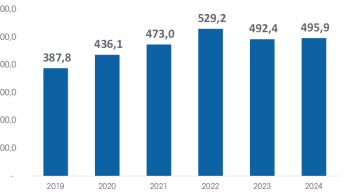
deep insights, facts & figures
03.08.2010
With regard to the UK at the present, the only trend seems to be that there is no trend
While Home Retail Group, which includes Homebase, reported a decline in sales for the 13 weeks to the end of May, Travis Perkins, which includes Wickes, has more recently reported a sales uplift of over 2 per cent for the first half of the year. On top of general concerns about the market and continuing lack of consumer confidence, new uncertainty has now been added to retailers’ worries, with the recent announcement that the standard rate of value added tax (VAT) is to increase to 20 per cent at the end of the year. This is a tax increase which will impact on the sales of the majority of products sold through DIY stores, making them that bit more expensive. Clearly there is a concern therefore as to the effect this will have on sales – although it might lead to a bumper Christmas for retailers, since the increase does not come into effect until January. Meanwhile individual retailers have been progressing with their own formats to try to offer a point of difference. Among retailers which have disappeared entirely has been decorating specialist FADS. A long-established name on the British retail scene, FADS at one point had over 500 stores trading under a variety of names, in both high street and out-of-town locations. At the time it closed, the chain comprised just 16 outlets. The demise of FADS illustrates the difficulties which face the specialist in today’s market. Increasingly the major retailers are seeking to be generalists. So on the one hand B&Q are rolling out their TradePoint in-store sections, while on the other hand attempting to court passing trade and especially the female customer with a tempting housewares offer. B&Q intends that TradePoint will ultimately comprise 118 stores across the country. Effectively they are 350sq metre trade sections within existing stores, where access is restricted to TradePoint members who have credentials as genuine trade customers. It is expected that TradePoint will leverage synergies with Kingfisher’s existing Screwfix operation, which has a long record of serving the trade, while also benefiting from B&Q’s existing store infrastructure. This is not however Kingfisher’s first attempt to cash in on the building products market and comes just 18 months after the closure of its stand-alone Trade Depot chain which grew to nine stores before it was revealed that the experiment was loss-making and the stores were shut down. Clearly if the trade departments are housed within existing B&Q stores, the cost implications are considerably less. At Wickes the main interest has been on its new showroom offer – kitchens and bathrooms. Buoyed by results at the turn of the year, which showed that this area of their offer had enjoyed a 23 per cent sales uplift during 2009, the company announced earlier this year that it would be introducing new Wickes Kitchens & Bathrooms stores of 450-900sq metres. The stores will be situated on a mixture of high street sites and retail parks. The first two have already opened in the south of England, with a third planned for London. To a large extent, the Wickes initiative is a response to the collapse of MFI in 2008 which has left a significant opportunity in the kitchen and bathroom market. The environment continues to be a focus for innovation in the sector, especially for market leader B&Q. During this year the retailer has been introducing environmental sections, which it is calling eco shops, into its stores. As well as selling energy saving products under the One Planet Home slogan, these stores also feature eco advisors with special qualifications to advise customers about simple, low cost solutions to help reduce the environmental impact of their homes and also cut down on running costs. B&Q has also spoken out in support of new EU legislation which closes a loophole which had made it possible for illegally logged timber to be sold in Europe. Allegedly up to a fifth of timber sold in the EU had been coming from illegal sources. Now all companies selling timber products in the EU will be required to demonstrate that the materials come from responsibly managed timber sources. According to B&Q, this change levels the playing field in favour of responsible retailers who have in any case been doing this for a number of years. In a related development, the past year has seen a great increase in the popularity of gardening, and in particular “grow your own”. According to market research, gardening grew by 10 per cent during 2009, while DIY sales fell by more than 3 per cent. Homebase has capitalised on the trend by launching a new gardening website which features over 50 “How To Do It” articles and 30 instructional videos. Within the overall growth of gardening, the most interesting trend is that most of the growth is on the vegetable side, rather than the flowering plant side – sales of vegetable seeds now outstrip those of flowering varieties by a large margin. The desire for organic food and to save money seems to be the driving force behind this trend, which has also seen a big increase in sales of chicken coups and related items, as more people have turned to producing their own eggs – another good sales opportunity for DIY and garden retailers. Underlying the entire market however remains a spirit of price competition. From time to time this has flared up into an overt price war, especially on products such as insulation. During this year and last, all the major retailers have indulged in major price promotion on insulation. Meanwhile B&Q launched a price checker campaign called Decorate for Less, which ran on television and press advertising and was aimed specifically at Homebase, claiming that it was cheaper than its competitor on 90 per cent of decorating products. Homebase retaliated with the launch of a new Value range, comprising more than 300 items – tools, decorating products, cookshop and gardening - 150 of which cost less than £5 (6 Euros). For now all retailers are fighting to stay in the game and make the most of the competitive conditions. Whether they all have the strength to survive the coming privations of increased VAT and very likely depressed consumer spending remains to be seen. The pressures on the high street remain, as evidenced by the announcement this month that Britain’s oldest hardware store is to close its doors. Gill & Co of Oxford started trading in 1530, during the reign of Henry VIII, but the owner says that the store will close at the end of July – and that his business has become a victim of the younger generation of consumers heading to the B&Q store on the edge of town.
Related articles
Read also

 Menü
Menü














